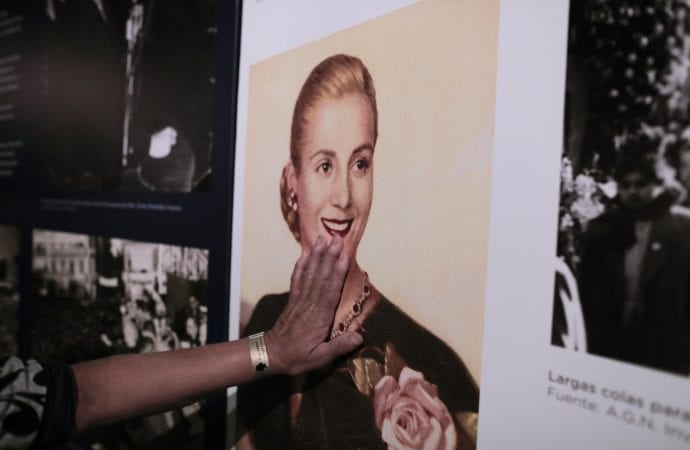Argentina’s labor union has launched a campaign to see Evita Peron, the actress who became a popular first lady in the 1940s and ’50s and who was once declared by the country’s congress as “Spiritual Leader of the Nation,” formally declared a saint by the Catholic Church.
In response, sources in the local church seem to be saying: “Not so fast.”
The wife of legendary Argentine politician and president Juan Perón may be best known to English-speakers thanks to the 1978 musical Evita by Andrew Lloyd Webber and Tim Rice, which became a 1996 film with Madonna and Antonio Banderas.
Despite Pope Francis’s known preference for Peron’s party, technically called the Partido Justicialista whose ideology is known as “Peronism,” officials of the Argentine Church told local news outlets that since Evita’s love of the poor wasn’t inspired by any particular religious conviction, it’s likely not enough to open a sainthood cause.
Argentina’s General Confederation of Labor reportedly sent the Vatican their request for Evita, which they titled “Saint of the People,” though it’s unclear if they followed any of the required protocol.
The process to recognize a person as a saint is a long one. Since Evita died in Buenos Aires, a cause would theoretically begin there, under Cardinal Mario Poli, Francis’s successor in his country’s capital.
If the diocesan phase concludes successfully, the cause goes to the Vatican. The first stage would be an examination of the person’s virtues and holiness, which can end in a declaration of “venerable.” Then it’s necessary to prove that through the candidate’s intercession God performed a miracle for the person to be beatified, and a second one to be canonized.
An exception to the rule can be made when a person is declared a martyred, meaning that he died in odium fidei, or “hatred of the faith,” but Evita died of cancer.
A pope could choose to ignore these steps and declare a person a saint directly, but there’s no indication Francis plans to do so. Had he been inclined, he could have opened the canonization cause during the more than a decade he spent himself as the head of the Archdiocese of Buenos Aires.
Evita died in 1952 at the age of 33. Days later, Argentina’s Union of Newspaper Sellers sent a letter to the Vatican asking for the opening of a sainthood cause, a request diplomatically turned down by the Holy See.
However, her informal “canonization” among those who followed her and her husband was not deterred, particularly among low-income and working-class Argentines referred to as descamisados, or “shirtless ones,” who have long venerated her as a “saint” in a secular, popular sense.
Descamisados quickly took to calling her “Santa Evita.” She spent many hours per day meeting with the poor, often kissing them and placing her hands in the wounds of the sick and the poor.
The authors of Evita: The Real Life of Eva Peron argue that when Evita kissed the syphilitic and touched lepers, she “ceased to be the president’s wife and acquired some of the characteristics of saints depicted in Catholicism.”
Almost 70 years after her death and not long after the 100th anniversary of her birth, taking advantage of having an Argentine in the see of Peter, the country’s labor union decided to try to make that popular recognition official.
However, not everyone in Argentina sees Evita in quite the same way. It’s worth noting, for instance, that many accuse Evita and her husband of corruption and of being the beginning of the end for Argentina’s once-prosperous future.
During the first three decades of the 20th century, Argentina outgrew Canada and Australia in population, total income, and per capita income, and by 1913 it was the world’s tenth wealthiest nation. Beginning in the 1930s, however, political instability triggered chronic economic decline, which culminated in the “Argentine Great Depression” that begin in 1998.
Many Catholic observers would say that Evita is a bit like Princess Diana, a later version of a “secular saint” - someone who achieved great popularity and seemed to want to do good, but not on the basis of a deep Christian faith.
According to Clarin, one of the country’s biggest daily newspapers, a source within the local church said that being seen as a good person is not enough to make someone a saint. Doctrinal orthodoxy, religious practice and a faithfulness to the Church are needed, and these are all things Evita arguably lacked - not to mention that she was highly critical of the ecclesiastical hierarchy of her time.
Archbishop Eduardo Martin of Rosario told reporters Wednesday he was “surprised” by the request, but that at the end of the day, “it’s legitimate to request something.”
“Everyone can ask,” Martin said, “but I don’t know if they formalized the request through proper channels.”
For the Church, the bishop said, “saints are models to be followed in life and intercessors,” he said, adding that a person is only declared a saint for “eminently religious reasons,” and no others.

